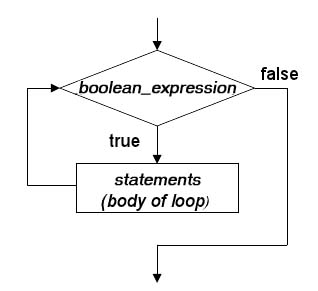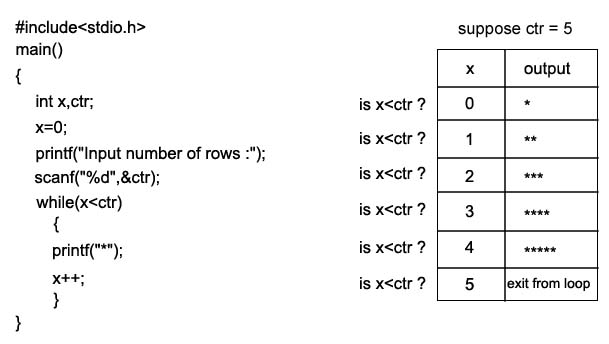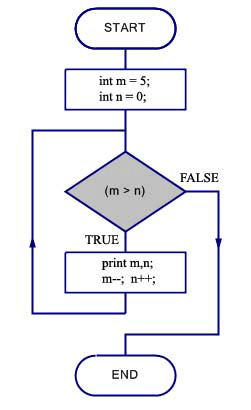C while loop
Description
The most basic loop in C is the while loop and it is used is to repeat a block of code. A while loop has one control expression (a specific condition) and executes as long as the given expression is true. Here is the syntax :
Syntax:
while (condition)
{
statement(s);
}
In while loop first the condition (boolean expression) is tested; if it is false the loop is finished without executing the statement(s). If the condition is true, then the statements are executed and the loop executes again and again until the condition is false.
If there is only one statement, the braces may be omitted; however, it is good practice to always include the braces.
See the flowchart :

A Simple While Loop Example -1
The following program prints n asterisks.

Example - 2:
The following program prints two numbers.
#include <stdio.h>
main()
{
int m = 5;
int n = 0;
while (m > n)
{
printf("m = %d n = %d\n",m,n );
m--;
n++;
}
}
Output:
m = 5 n = 0 m = 4 n = 1 m = 3 n = 2
Explanation
The loop will terminate when m becomes equal to or lesser than n, hence m <= n is the terminating condition of the while loop.
The loop has executed 3 times.
The condition m>n has checked 4 times.
First time : m = 5 and n = 0, this time the condition is true, so loop is executed.
Second time : m = 4, and n = 1. Again the condition is true, so the loop is executed.
Third time : m = 3 and n = 2. Again the condition is true so the loop is executed.
Fourth time : m = 2 and n = 3. Now the condition is false, hence loop is not executed.
Therefore this is the last time the condition m>n is checked in the program.
Here is the flowchart of the above program

Previous: C for loop
Next: C do while loop
C Programming: Tips of the Day
Static variable inside of a function in C
The scope of variable is where the variable name can be seen. Here, x is visible only inside function foo().
The lifetime of a variable is the period over which it exists. If x were defined without the keyword static, the lifetime would be from the entry into foo() to the return from foo(); so it would be re-initialized to 5 on every call.
The keyword static acts to extend the lifetime of a variable to the lifetime of the programme; e.g. initialization occurs once and once only and then the variable retains its value - whatever it has come to be - over all future calls to foo().
Ref : https://bit.ly/3fOq7XP
- New Content published on w3resource:
- HTML-CSS Practical: Exercises, Practice, Solution
- Java Regular Expression: Exercises, Practice, Solution
- Scala Programming Exercises, Practice, Solution
- Python Itertools exercises
- Python Numpy exercises
- Python GeoPy Package exercises
- Python Pandas exercises
- Python nltk exercises
- Python BeautifulSoup exercises
- Form Template
- Composer - PHP Package Manager
- PHPUnit - PHP Testing
- Laravel - PHP Framework
- Angular - JavaScript Framework
- Vue - JavaScript Framework
- Jest - JavaScript Testing Framework
